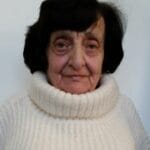
Minna Gorelik, z"l (Russia)
My name is Minna Gorelik (maiden name Asknazyeva), and I was born in 1931 in Staraya Russa, Leningrad Region, Russia. Both of my parents were doctors, but my father lost his life during the 1939 Winter War.[1]
World War II began for Russia on June 22, 1941. At that time I was living with my mother and grandmother in a Leningrad kommunalka, an apartment where several families shared a bathroom and kitchen.[2] Because my mother was a doctor, she was subject to conscription into the army, and was called up for military service in the first days of the war. I stayed in Leningrad with my grandmother, Beilya Meltzer, and we were there when the Siege of Leningrad began on September 8, 1941.
At the start of the siege, my grandmother and I received just over 500 grams of bread a day, but after one month that had gone down to just 400 grams.[3] By November, our ration of bread per day was down to 300 grams. My grandmother was a diabetic, so a month into the siege she was unable to walk. I would go to the local grocery store to get our bread rations, then to the Neva River to scoop water into a toy bucket. In October, the Germans had started attacking the city with artillery and from airplanes, so the water system was quickly destroyed.
That November a special rescue team was formed to gather children whose parents had been killed or who were living in the streets. They took me as well. I was put on a truck with children from an orphanage, and we were taken to a pier and loaded onto a boat. Later that night, our boat sailed across Lake Ladoga. On the other side of the lake, we were placed on trains and evacuated. I was hungry and weak. We were just little children in a cattle car, with only two adults and very little food and water, and we suffered with lice. The little boy next to me was Slava Kuskov, who pulled the lice from my long braids and ate them. During that deadly ride, our train was attacked many times by German airplanes.
We finally made it to Sverdlovsk (now known as Yekaterinburg), where a local resident, Feodosia Kushner, took Slava and me to her home right from the railway station. She cut all of our hair off right away and went to a flea market to buy two sheep skins to make fur coats for us. I attended school in Sverdlovsk. The first floor of the school was being used as a military hospital. I often went down to the first floor to sing and recite poetry for wounded Red Army soldiers and officers.
In late 1941 or early 1942, my mother was discharged from the military and came to live with us. She worked as a prenatal doctor in a metallurgical plant in Verkh-Istesky.[4] We lived nearly four years in Sverdlovsk, but in 1945 my mother and I moved to Moscow, where we lived in a small hut with no running water or toilet. We were able to return to Leningrad in 1946, though by then our apartment was occupied by an NKVD officer.[5] We wound up living with friends and moving every two to three weeks because my mother didn’t have an official residence card and wasn’t able to work for the same reason. She finally took a job cleaning specimens in laboratories, despite the fact that she was a first-rate gynecologist. She finally received an official residence card and we were able to find a place to live.
I graduated from high school and went to Medical School. I became a doctor and worked in a factory 30 kilometers from Leningrad, where I met my husband. We got married and I returned to Leningrad to work as a local physician. Our son was born in 1960. For medical reasons, I could not work as a primary physician so I went on to study in the surgery department. I took four months of special courses and went to work in the trauma unit. I worked there until I retired.
My husband and I came to Tucson in 1996.
[1] The Winter War of 1939 was a brief conflict between the Soviet Union and Finland that occurred just after the start of World War II.
[2] A Kommunalka was a typical living arrangement in the Soviet Union. The noun comes from the word “communal.”
[3] 400 grams equates to .88 pounds.
[4] Verkh-Isetsky is a region within Yekaterinburg.
[5] The NKVD (People’s Committee for Internal Affairs) is a forerunner of the KGB.
